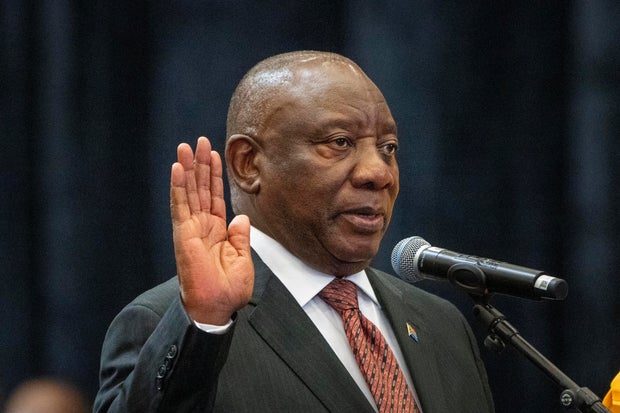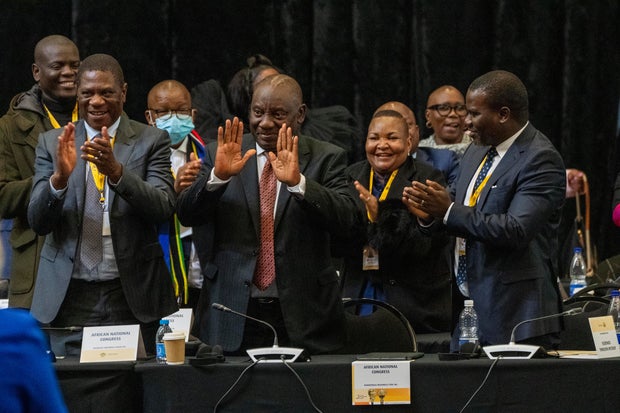South African president Cyril Ramaphosa was re-elected by lawmakers to a second term on Friday after his party reached a dramatic coalition deal with a former political enemy just hours before the vote.
Ramaphosa, the leader of the African National Congress, won convincingly in Parliament against a surprise candidate who was also nominated – Julius Malema of the far-left Economic Freedom Fighters. Ramaphosa received 283 votes to Malema’s 44 in the 400-member House.
Ramaphosa, 71, secured his second term with the help of lawmakers from the country’s second-largest party, the Democratic Alliance, and some smaller parties. They supported him in the vote and got him over the finish line after the ANC lost its long-standing majority in a historic election two weeks ago, which reduced it to 159 seats in Parliament.
During a break in what turned out to be a marathon parliamentary session, the ANC signed the last-minute deal with the DA, effectively ensuring that Ramaphosa would remain leader of Africa’s most industrialized economy. The parties will now co-govern South Africa in their first national coalition where no party has a majority in Parliament.
Jerome Delay/AP
The agreement, referred to as a national unity government, unites the ANC with the DA, a white-led party that for years was the main opposition and the ANC’s fiercest critic. At least two other smaller parties also joined the agreement.
Ramaphose called the agreement – which sent South Africa into uncharted waters – a “new birth, a new era for our country” and said it was time for the parties to “overcome their differences and work together”.
“That’s what we must do and that’s what I’m committed to achieving as president,” he said.
The ANC – the famous Nelson Mandela party — has governed South Africa with a comfortable majority since the end of the apartheid system of white minority rule in 1994.
But he lost his 30-year majority in the humiliating national elections of May 29, a turning point for the country. The vote was held in a context of widespread discontent among South Africans regarding high levels of poverty, inequality and unemployment.
Analysts warn that there could be complications in the future, given the starkly different ideologies of the ANC, a former liberation movement, and the centrist, business-friendly DA, which won 21% of the vote in the national elections, the second highest percentage behind the 40 % of the ANC.
On the one hand, the prosecution disagreed with the ANC government’s decision to accuse Israel of genocide in Gaza in a highly sensitive case at the United Nations’ top court.
DA leader John Steenhuisen was the first to confirm the deal.
“From today, the DA will co-govern the Republic of South Africa in a spirit of unity and collaboration,” he said as he stepped away from Friday’s proceedings for a live televised speech in which he said that an agreement was signed that DA lawmakers would vote for Ramaphosa for president.
The Parliament session began at 10am, in the unusual setting of a conference center near Cape Town’s waterfront, following the city’s historic event National Assembly building was destroyed in fire in 2022. The Chamber underwent for the first time the hours-long swearing-in of hundreds of new legislators and the election of a president and vice president.
Voting for president began late at night, with the results announced well after 10 p.m. Ramaphosa finished his acceptance speech as the clock passed midnight and entered Saturday.
Former President Jacob Zuma’s MK Party boycotted the session, but this did not affect the vote as only a third of the House is needed for a quorum.
Jerome Delay/AP
ANC Secretary-General Fikile Mbalula said the party was open to talking to anyone who wanted to join the unity government. There are 18 political parties represented in Parliament and he said the multi-party agreement would “prioritize the country despite political and ideological division”.
Some parties, including Malema’s EFF, refused to join.
The other two parties that joined the coalition agreement were the Inkatha Freedom Party and the Patriotic Alliance, which drew attention in part because its leader, Gayton McKenzie, served a prison sentence for bank robbery.
McKenzie said he has been given a second chance in life and that South Africa has one now too, an opportunity to resolve its deep socio-economic problems.
The ANC faced a deadline to reach a coalition agreement, as Parliament had to vote for the president within 14 days of declaring the election results on 2 June. overnight from Thursday to Friday, party officials said.
South Africa has not faced this level of political uncertainty since the ANC came to power in the first multiracial elections in 1994, which ended almost half a century of racial segregation. Since then, all South African leaders have come from the ANC, starting with Mandela.
The new unity government also recalled the way Mandela, South Africa’s first black president, invited political opponents to be part of a unity government in 1994, in an act of reconciliation, when the ANC had a majority. Ramaphosa played a key role in these negotiations when he was a young politician.
This time the ANC’s hand was forced.
“The ANC has been very magnanimous in accepting defeat and saying, ‘let’s talk’,” said AP leader McKenzie.
bol co
jogo de terror online
novela sbt ao vivo
wishlist
musica terra seca
taça png























